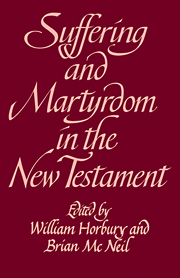 Suffering and Martyrdom in the New Testament
Suffering and Martyrdom in the New Testament Book contents
- Frontmatter
- Contents
- Abbreviations
- G. M. Styler and the Cambridge New Testament Seminar
- 1 Introduction
- 2 Did Jesus teach that his death would be vicarious as well as typical?
- 3 Imitatio Christi and the Lucan Passion narrative
- 4 The persecution of Christians in John 15: 18–16: 4a
- 5 Interchange and suffering
- 6 On the interpretation of Colossians 1: 24
- 7 Preparation for the perils of the last days: 1 Thessalonians 3:3
- 8 Maintaining the testimony of Jesus: the suffering of Christians in the Revelation of John
- 9 Martyrdom and inspiration
- 10 Suffering and martyrdom in the Odes of Solomon
- 11 Suffering and messianism in Yose ben Yose
- 12 What might martyrdom mean?
- Index of authors
- Index of references
- Index of subjects
6 - On the interpretation of Colossians 1: 24
Published online by Cambridge University Press: 26 February 2010
- Frontmatter
- Contents
- Abbreviations
- G. M. Styler and the Cambridge New Testament Seminar
- 1 Introduction
- 2 Did Jesus teach that his death would be vicarious as well as typical?
- 3 Imitatio Christi and the Lucan Passion narrative
- 4 The persecution of Christians in John 15: 18–16: 4a
- 5 Interchange and suffering
- 6 On the interpretation of Colossians 1: 24
- 7 Preparation for the perils of the last days: 1 Thessalonians 3:3
- 8 Maintaining the testimony of Jesus: the suffering of Christians in the Revelation of John
- 9 Martyrdom and inspiration
- 10 Suffering and martyrdom in the Odes of Solomon
- 11 Suffering and messianism in Yose ben Yose
- 12 What might martyrdom mean?
- Index of authors
- Index of references
- Index of subjects
Summary
‘It is now my happiness to suffer for you. This is my way of helping to complete, in my poor human flesh, the full tale of Christ's afflictions still to be endured, for the sake of his body which is the church’
(Colossians i: 24, NEB).In an earlier letter St Paul had indignantly repudiated the idea that it was he who had been crucified for the sake of others. In this passage he asserts the value for others of the sufferings which he is enduring, and speaks of them as ‘the afflictions of Christ’. How are these two points of view to be related to each other?
It is clear that Colossians 1: 24 must have considerable importance for any consideration of the place of suffering and martyrdom in the New Testament. In his commentary on the epistle Professor C. F. D. Moule devotes more than five pages to the study of this verse, and it will be helpful for us at the outset if we avail ourselves of the convenient distinction that he draws between two main lines of interpretation:
(1) That which links the verse with Pauline teaching about Christians as those who are ‘in Christ’. ‘Christ's sufferings (on the cross and throughout his ministry) are necessarily shared by Christians…their union with him involves their participation in his sufferings.’
(2) That which links the verse with the conception of the ‘messianic woes’. ‘There is a “quota” of sufferings which “the corporate Christ”, the Messianic community, the Church, is destined to undergo before the purposes of God are complete.’
- Type
- Chapter
- Information
- Suffering and Martyrdom in the New TestamentStudies presented to G. M. Styler by the Cambridge New Testament Seminar, pp. 84 - 90Publisher: Cambridge University PressPrint publication year: 1981
- 1
- Cited by


